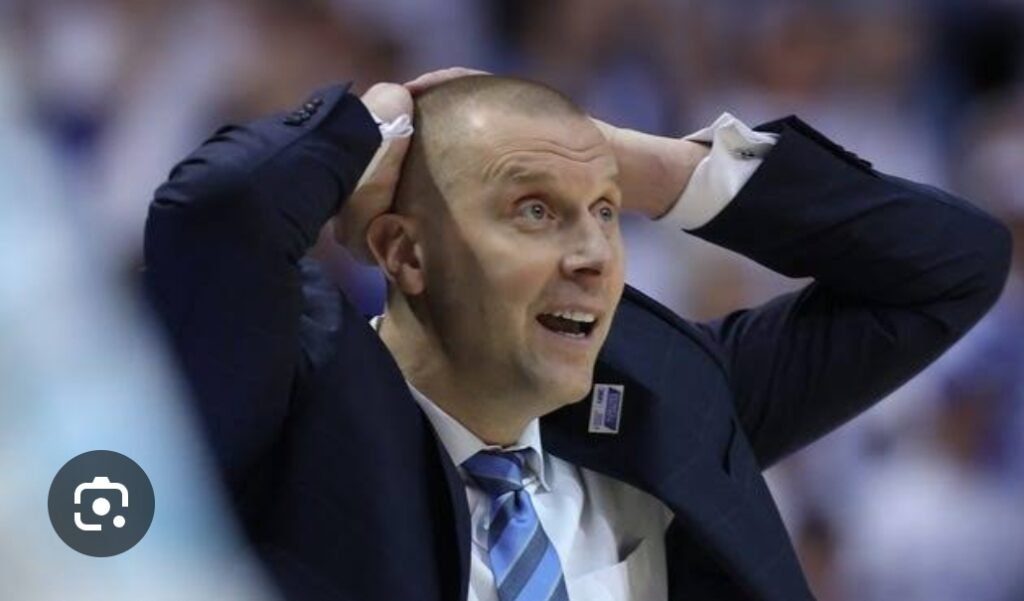In a post-game interview that sent ripples through the college basketball world, Kentucky Wildcats head coach Mark Pope didn’t hold back. His team had just suffered a heartbreaking loss to Alabama, a game that many fans, analysts, and even Pope himself felt was marred by questionable officiating. In a heated response, Pope claimed that his players were “robbed” by the referees, further intensifying the already emotionally charged atmosphere surrounding the game. This bold statement stirred up controversy, fueling debates about fairness, integrity, and the influence of officiating in college basketball.
The game, which had been a thrilling back-and-forth affair, was decided in the final minutes by a series of calls that appeared to go against the Wildcats. Pope, a coach known for his intense demeanor and passion for his players, was visibly frustrated during the post-game interview. “Our guys played their hearts out. They left everything on the court, and for them to have that game taken away by bad calls—it’s just not right,” Pope declared, his voice rising in indignation. “This wasn’t just a bad call here and there; this was an entire stretch of the game where the referees simply lost control.”
Pope’s accusation came in response to two critical calls that many Kentucky fans believed were game-changing. The first involved a controversial foul called on a Wildcats defender, who appeared to have cleanly blocked a shot in the final seconds, only for the referee to whistle a shooting foul. Alabama’s player stepped up to the free-throw line and converted both attempts, giving them a lead that Kentucky was never able to recover from. Pope argued that the call was both inaccurate and pivotal, tipping the scales unfairly in favor of the Crimson Tide.
The second contentious moment came when Kentucky’s star player was charged with an offensive foul during a fast-break, a call that some felt was both ticky-tack and ill-timed. With Kentucky already trailing by a slim margin, the foul limited their offensive options and gave Alabama a chance to extend their lead. Pope, ever the strategist, saw this as a pivotal moment in the game, a moment that could have allowed his team to claw their way back into contention.
The controversial remarks were not lost on the wider basketball community. Critics of Pope’s claims argued that the loss was a result of Kentucky’s inability to execute in the clutch, and that blaming the referees was simply a way to deflect attention from the team’s shortcomings. Some even questioned Pope’s integrity, suggesting that his fiery comments were a convenient scapegoat for what could have been an avoidable defeat.
However, Pope’s supporters quickly came to his defense, emphasizing the human element of officiating and the pressures officials face in fast-paced, high-stakes environments. “Everyone saw what happened on that court,” one assistant coach commented. “It’s not about making excuses; it’s about holding the game accountable to a standard. If we let bad officiating slide, then we’re doing a disservice to the game and to these players who deserve better.”
The controversy didn’t end with the interview. Social media platforms were flooded with debates, as fans from both sides weighed in on the fairness of the officiating. Alabama fans defended the calls, while Kentucky supporters rallied behind Pope, creating an atmosphere of division that overshadowed the game itself. The result was a clear reminder of the passion and intensity that surrounds college basketball, where every call, every decision, and every outcome is subject to scrutiny.
In the end, Pope’s comments became a flashpoint in a larger discussion about the role of referees in college basketball. Was Kentucky’s loss truly a result of poor officiating, or was it simply a case of the Wildcats failing to close out the game when it mattered most? That debate, as contentious as it was, would likely rage on long after the final whistle had blown. What was clear, however, was that Mark Pope’s frustration had opened up a conversation about accountability in officiating that was unlikely to be ignored any time soon.

